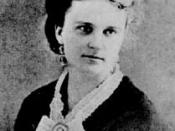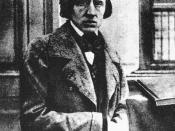An Absence of Reserve Many of Kate Chopin's works were rejected and damned during her lifetime. Some reasons are her intense feelings about independence for women, the era in which she lived (the late 19th Century), and the region in which she lived ("The South" )(Angelfire). Another reason her work was scorned is her honesty about her character's true qualities (Howard).
Kate Chopin's writing has had a significant influence upon both men's and women's personal feelings toward women's roles, as well as society's images of a woman. At the point in time that Chopin's most notable work, The Awakening, was published, the understood role of the "ideal woman" would be as the unobtrusive but supportive wife and modest mother. This woman would never speak her mind in public unless it was an echo of her husband's thoughts, nor would she engage in discussions about or behavior even leaning toward any form of sexuality - but especially not infidelity.
(Goddess) Since most of Chopin's writings touch upon women's passions, sexuality, independence, marriage and infidelity, and because her characters were often portrayed as very independent women who could take or leave men (figuratively and literally), much of her work was rejected. It stands to reason that if rejected by male reviewers as she was (because most of the reviewers were men), that the women (their wives, mothers, sisters and daughters) would, as required by the mores of the times, reject her too. Ann Bail Howard, in her Internet article, tells us that although Chopin writes for all women, "it is the woman who demands her own direction and chooses her own freedom that interests Chopin the most." (Howard) No namby-pamby women for Kate, no sir. Unfortunately, that is one of the main reasons her writing was criticized so strongly. No men of that time wanted their wives even coming close to the independent modes of thought that Chopin's characters had, much less imitating their moral values. For example, Chopin writes quite a lot about infidelity, both directly and indirectly. In The Storm, a man and a woman commit adultery while thrown together by a storm. And in A Respectable Woman, although Chopin does not explicitly tell us that Mrs. Baroda has an affair with her husband's friend, she strongly implies it at the end of the story when Mr. Baroda says to Mrs. Baroda: "I am glad, chere amie, to know that you have finally overcome your dislike for him [his friend]; truly he did not deserve it." and Mrs. Baroda replies: " 'Oh,' she told him, laughingly, after pressing a long, tender kiss upon his lips, 'I have overcome everything! You will see. This time I shall be very nice to him.' " Even an undercurrent shadowing of this type of behavior was enough to offend society of the South in the late 1800's. Respectable women just did not think on those sorts of tawdry subjects.
And speaking of respectable women, in her short story, A Respectable Woman, when describing the personality of the main character, Mrs. Baroda, Chopin tells us "there was an absence of reserve in her manner; yet there was no lack of womanliness." "Reserve," in the way she uses it here, is exactly what the women of the time, especially Southern women, exhibited in their demeanor and behavior - in an almost exaggerated way. As an example, let's take a look at a couple of characters created by another woman writing about the South in the same century: the women from Margaret Mitchell's Gone With The Wind -- Scarlett and Melanie. Although these characters portrayed women of the antebellum South, Chopin's characters were not even a generation behind them and the standards for women were not very much different. In one of the opening scenes, we see Scarlett with her "Mammy," getting ready to go to a party. Mammy tells her that she better eat something before she goes because "it just ain't fittin'" for a young lady to be seen eating too much at a social event. And Melanie, God, we just want to smack her and tell her to stand up for herself when Scarlett is swooning after and wooing Ashley away from her (Mel) right in front of her nose, but still Melanie says to the other ladies of their social group about Scarlett: "Oh, she's just a darlin'â¦she means no harm." She wouldn't dare speak out against Scarlett, a peer with her on the "respectable women's" social scene.
The belief at the time of Chopin's writings, which dealt with the subjects of women moving outside the mores of society as well as out of the grasp of their male counterparts, was that merely by reading Chopin their women (and their children) would be corrupted. But even worse than that, was the fact that Chopin made no real apologies for her characters' values in that she defended their actions as reasonable. (Angelfire) - THAT was unforgivable. Emily Toth says, when discussing the reasons for such universal rejection and condemnation of Chopin's work, that the feeling at the time was that: "The awakening of a respectable woman to her sensual nature might have been acceptable in 1899 if the author had condemned her" (Toth 96). So, even though Chopin shouldn't have been writing about such subjects, she would have been forgiven for doing so IF those women were condemned, with say, a "scarlet letter??" But it was hard for Kate Chopin to do that because, as Toth says: "Young Katie got to gawk at a raffish world that respectable young girls were not supposed to know anything about" (Toth 1).
This "image" of womanhood that most of the late-19th Century society held was further exaggerated in South than at any other place. There, at that time, women were not supposed to even know anything about procreative sex, much less sex for pleasure, nor were they supposed to be involved in anything that was vulgar or unseemly (which included talking about any "Women's Rights" issues). In fact, often they were publicly castigated for public ally expressing ANY of their views, whether socially acceptable or not; they were not supposed to have opinion. Here, in an excerpt from the memoirs of a Southern belle, is an example: "Miss Hetty Cary, â¦having incurred the displeasure of the military government of Baltimore by shaking from the window of her father's home, while the Union troops marched by it, a Confederate banner smuggled through the lines, had been warned to leave Baltimore under penalty of immediate arrest and transfer to a Northern bastile. " Exiled from her hometown - merely for stating her opinion (Harrison 58).
Because of the subjects she chose to write about (women's rights and independence, sexuality, infidelity, etc.) and the time in which she wrote about them (the late 19th Century) as well as the region about (and from) which she wrote (The South), Chopin's writing was not well received. Further antagonizing reviewers of the era was her ability (in their minds, her "audacity) to be honest about her character's moral composition, thoughts and behaviors. Her work is now required reading in most English Literature classes and Women's Studies programs on college campuses and, if she were alive today and still writing, would probably be a best seller. In the words of one of her most loyal readers, Howard, Kate Chopin truly was, "A Woman Far Ahead of Her Time." Works Cited Angelfire Member's Pages. "Kate Chopin; A Woman Ahead of Her Time: Society in Kate Chopin's Lifetime". Online. Internet. March 15, 2002.
http://www.angelfire.com/nv/English243/Society.html.
Harrison, Mrs. Burton. "Recollections Grave and Gay 1843-1920". (from University of North Carolina at Chapel Hill Libraries: Documenting the American South.
Electronic Edition) Online. Internet. March 15, 2002.
http://docsouth.unc.edu/clay/clay.html#clay278.
Howard, Ann Bail. "A Woman Far Ahead of Her Time". (from Virginia Commonwealth University English Department Website) Online. Internet. March 15, 2002.
http://www.vcu.edu/engweb/eng384/chopinhoward.htm Sprinkle, Russ."Kate Chopin's The Awakening: A Critical Reception". Domestic Goddesses. 1998 Online. Internet. March 15, 2002 http://www.womenwriters.net/domesticgoddess/strickland.htm.
Toth, Emily. Unveiling Kate Chopin. Mississippi: University of Mississippi Press, 1999.




